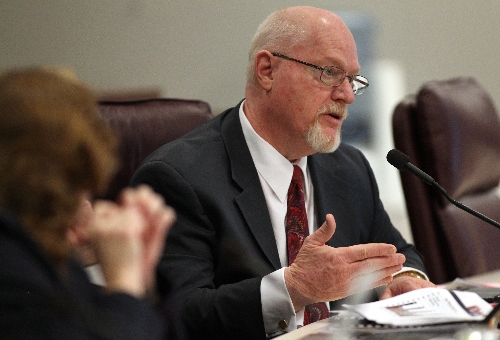Assemblyman: ‘Difficult times’ present challenge
Editor's note: This is one in a series of profiles of freshman lawmakers in the 2011 Legislature.
CARSON CITY -- New Assemblyman Randy Kirner should not have any problem handling the heat from angry special interest groups if the Legislature cuts state agency budgets.
As chairman of the Public Employees' Benefits Program, the Minden Republican last summer put together changes that cut $81 million in health care benefits for employees and increased their medical care costs by $30 million.
It would be an understatement to say employees weren't exactly pleased to have to pay more to get fewer benefits.
"The reception was cool," said Kirner, a former military officer. "We worked very hard on a plan that still will be beneficial for employees. Give it time to work. Nobody wants cuts, but these are difficult times."
A retired International Game Technology executive, Kirner is a one of a number of new Republican legislators with business and local government backgrounds who will try to use their experience to change how state government operates.
"We all bring different experiences," Kirner said. "Mine is in personnel and pension and health care plans. This is one of the most challenging periods in modern history. I was intrigued by the potential to make a contribution."
When he was elected, he resigned from the Public Employees' Benefits Program board. He served 11 years on the board.
Kirner attended military colleges and planned on a military career. But facing a second tour in Vietnam in 1971, he decided to embark on a private business career.
As a legislator, he wants to reduce the ever-increasing government contributions to the Public Employees' Retirement System by switching new employees to a defined contribution plan.
He also favors Gov. Brian Sandoval's block grant approach to funding class-size reduction in public schools and other education programs.
Schools in more economically distressed areas need fewer children per class, compared with more affluent areas where there typically is a lot of parent involvement, Kirner said. The local schools should be given the power to make these types of decisions, he said.
"There is an old management rule: Push the decision down to the best level to solve the problem. The state is not the best level."
Kirner did not sign a pledge to oppose all tax increases but agrees with Sandoval that taxes are not the way to go.
"I am listening. I want to understand their (Democrats') perspective. If we can get it done without taxes, I am right there," he said.
His free time is spent mainly with his family. Kirner a summer ago took his grandson Branden on a tour of Indian villages, mining sites and historic places in California.
The boy was about to begin fourth grade, and one of his classes was in California history.
"I wanted him to have a real sense of history so we went everywhere and learned how California came to be," Kirner said. "It turned out to be a lot of fun for him and for me."
Contact Capital Bureau Chief Ed Vogel at evogel@reviewjournal.com or 775-687-3901.
RANDY KIRNER
Position: Assembly member
Party: Republican
District: District 26 in Washoe County
Age: 64
Position: Retired. Former human resources manager for International Game Technology.
Education: Doctorate from University of La Verne in education organization leadership, master's degree from George State University in business administration and information systems, bachelor's degree from Northern Georgia College and State University military college.
Military service: Captain in the Army. Served one year in Vietnam
Family: Wife, Peggy; son, Jim of Las Vegas; daughter, Karen Pike of Orange, Calif.; three grandchildren.
Constituent contact: Phone: 775-684-8848; e-mail: rkirner@asm.state.nv.us
Quotable: "I am really just an old guy who wants to do a good job."






















